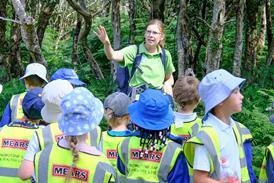Andy Smith from EVOLVE Advice on what schools can do to ensure families feel informed and reassured about educational visits.

Whether in the metaphorical or actual sense of the phrase, it’s essential that schools ‘bring parents with them’ on the educational visit journey.
Educational visits can be exciting, rewarding, impactful and memorable for all involved but if parents are not fully informed, they can be a source of concern and uncertainty.
If families are involved in the visit itself as volunteer helpers, ensure they are appropriately selected and suitable. Consider aspects such as DBS checks, volunteer driver forms, known behaviour etc.
Before the visit
- Give parents plenty of time and information to ensure they are clear on what it entails.
- Not all visits require parental consent - but if yours does, consent should be fully ‘informed’. Use your parent letter or a PowerPoint to do this.
- Ask parents if there are any changes to details that school already holds (e.g. emergency contact numbers) or if they need to make you aware of anything in relation to the visit (e.g. swimming ability, fear of heights).
- Allow parents the opportunity to ask questions and then prepare a FAQ document or have a parent meeting to cover these if required.
- Developing a code of conduct can help with ensuring that parents know what is expected of their child/young person on the visit and what the consequences of breaches are in advance (e.g. parents collecting).
- If families are involved in the visit itself as volunteer helpers, ensure they are appropriately selected and suitable. Consider aspects such as DBS checks, volunteer driver forms, known behaviour etc. Check you know their needs too.
- Volunteers must be competent which means considering their experience, personal qualities and whether they need any qualifications. And they will need to be suitably informed of what is expected of them and what the plan is.

During the visit
- Prior to the visit, you will have outlined how contact will be made with home. Also, consider pupils that may have their own mobile devices and how this will be managed - a mobile device policy helps. Ideally, school will be in control of communications home and they will be minimal to allow participants to be immersed in the experience.
- If you have ‘taken parents with you’ physically, it is important that you recognise that they may not be familiar with the school environment/policies/expectations or have the relevant training, so they need to be closely monitored. They also need to be supported with checking of their understanding, next steps etc.
- Children’s families are an important part of the school community and that extends to educational visits - whether they are ‘on the visit’ or left at home!
Please note: the wording ‘parents’ is used for readability in this article. However, it is recognised that this content applies to carers or others with parental responsibility.










